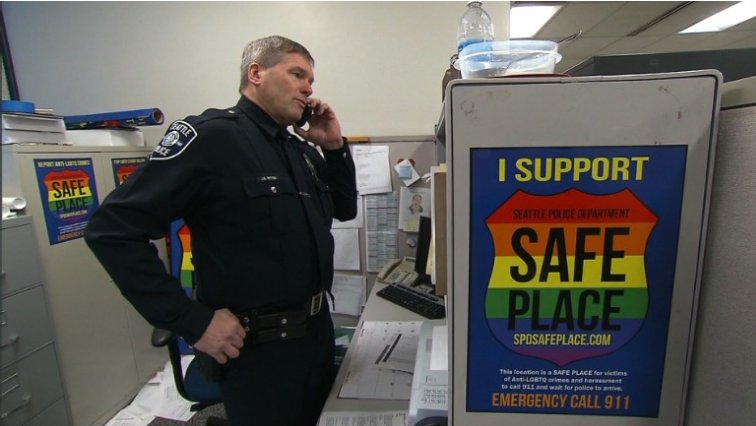Two years ago, Seattle Police Officer Jim Ritter realized his city had a major problem. People weren’t reporting hate crimes.
He’d hear about them, anecdotally. Some were horrifying incidents. But they weren’t showing up on police reports.
“After determining most of these crimes were being committed in the commercial districts throughout the city, (I) had to sit down and figure out what are we going to do about this,” Ritter said.
He started a program called Safe Place. It’s a first-in-the-nation initiative that designates local businesses as a place where victims of hate crimes can shelter while waiting for the police to arrive.
It’s a simple concept based on something he remembered from his childhood — houses with stickers that signaled to kids walking to school that if something bad happened, they could knock on the door and get help.
Ritter designed a sticker — a police shield with the LGBT rainbow symbolism. It goes on the front of any business agreeing to call police if a victim of a hate crime comes inside looking for help.
“In this day of communications, everybody just assumes someone else is calling police and we can’t afford to have that happen anymore, neither can these victims,” Ritter said.
Ritter, who is gay, admitted that he never knew so much anti-LGBT crime was going unreported in his own city, where he’d worked as a cop for nearly four decades.
‘We don’t want to screw this up’
Now, Safe Place has become so popular, he can barely think about anything else.
Police departments across the country are calling, asking for help implementing his program in Cincinnati, Louisville, Birmingham, Durham, Baltimore, Honolulu, Columbus — and even in Canada in Vancouver, British Columbia.
Most notably, the Orlando police launched Safe Place on the six-month anniversary of the Pulse Night Club massacre.
“I actually feel like I’m making a positive difference in society and not just going through the motions,” Ritter said. “I think the majority of police chiefs and administrators that contacted me said, ” Hey, Jim, we want to get this right, we don’t want to screw this up.”
He’s even working with the Department of Justice.
“You’ve got victims from all different kinds of minority communities that have the same thing happen to them. They are assaulted or victimized either because of who they are or who these suspects portray them to be.”
Here in Seattle, Ritter said two felony assault cases were reported from inside a Safe Place business within the program’s first week.
“One of those safe place locations, the witnesses were holding a suspect down when police arrived,” he said. And police immediately noticed an increase in the reporting of hate crimes.
“And that told me that it was starting to work as designed,” he said.
A recent report by the Southern Poverty Law Center says that hate groups are on the rise, and crimes against members of the LGBT community are up from last year.
‘You better watch your back’
Aaron Amundsen is one of the victims targeted right after the election in November.
He’s a Seattle tattoo parlor owner, and he walked out to his car one day to find a wet, wrinkled up note.
“I opened it up and thought: Is this a joke? And then it hit me, and I got really upset by it,” he said. “It was: ‘Hey blank, we won so you better watch your back.’ Just a bunch of political and anti LGBTQ slurs. And it was kind of threatening and really spooky.”
The note said, “Your days are numbered. Make America straight again to make it great again. You will see.”
It included two gay slurs.
‘Standing up for what’s right’
Amundsen didn’t report the incident right away. But his business partner posted it to Facebook, where it got a lot of attention. Ritter noticed it and encouraged Amundsen to file a police report. He did, and says he’s glad that he filed it, even if no one is ever caught.
“It’s about standing up for what’s right,” Amundsen said.
But Ritter said he’s having to have fewer and fewer conversations like that one — encouraging reluctant victims to report hate crimes. And that’s, in part, thanks to the awareness that Safe Place brought to Seattle.
“I’ve always known that the majority of the community is for the most part fundamentally fair and they want to do the right thing,” Ritter said. “I think the Safe Place initiative has caused the conversation to start where they can verbally acknowledge that, and feel comfortable about talking about topics which they really haven’t had the opportunity to talk about in the past.”
